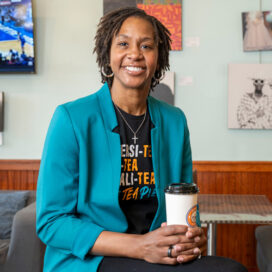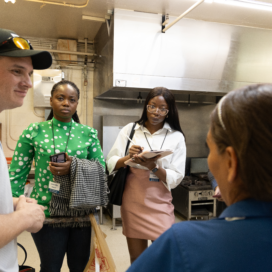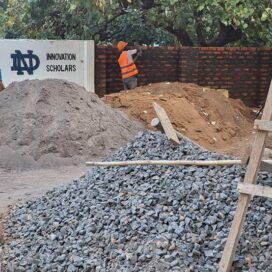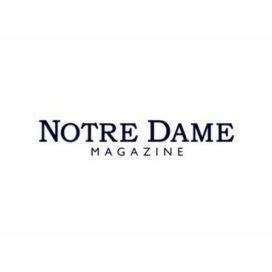Pandemic prayer
Published: March 30, 2020 / Author: Carol Elliott
Priest in the Notre Dame MBA program celebrates Mass alone each day as his contribution to the coronavirus battle.
Every day of the week, in the small chapel on the second floor of Mendoza College of Business, Father Arthur Joseph Ssembajja prays alone.
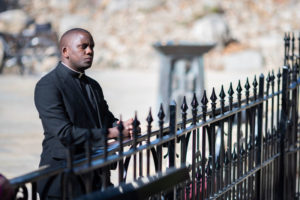
Fr. Arthur Joseph Ssembajja praying
Amid the great emptiness that is now the University of Notre Dame campus, Ssembajja, a priest from Uganda who is currently enrolled in the Notre Dame MBA program, makes the one contribution he can toward battling the coronavirus monster.
“I pray for God’s intervention, mercy and healing,” he says. “I pray for the Church to remain an icon of hope and presence of God in the world. I pray for civil leaders to make decisions that will benefit the whole of humanity. I pray for the University of Notre Dame – administrators, staff, faculty and students that the Lord keeps us and our families safe. That a day will dawn when we get to see each other face to face again.”
“I pray for my family in Uganda. Lastly, I pray for those on the frontline and all those suffering with the coronavirus.”
When the coronavirus first hit the U.S. in March, Ssembajja was not only 7,500 miles away from his home in Uganda, he was also nearly 2,000 miles away from the University of Notre Dame.
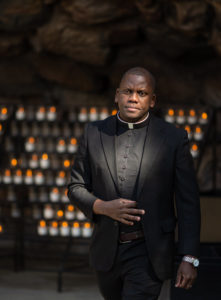
Fr. Arthur Joseph Ssembajja
Ssembajja is one of 55 students enrolled in the Notre Dame MBA course Business on the Frontlines (BOTFL). For the first two weeks of March, his team of five students and three advisers was in Honduras working with BOTFL partner Olancho Aid Foundation, assessing how to drive economic activity in the Olancho region through leveraging the foundation’s focus on education.
Meanwhile, the coronavirus ramped up its global rampage. On March 11, the following happened in quick succession:
The Honduran president forbade all his cabinet ministers from flying out of the country.
President Trump announced that as of March 13, the U.S. was banning foreign travelers from 26 countries in Europe for 30 days.
The World Health Organization declared that COVID-19 could now be characterized as a pandemic.
And Notre Dame president Rev. John Jenkins, C.S.C., announced that the University was canceling all in-person classes and moving them online.
“This is when reality hit hard and hit home,” said Ssembajja. “At that moment, I was concerned about three things: One, how and when would I reenter the USA with my F1 visa? Two, what did the near future look like for me, my friends and classmates who were abroad and on spring break, as well as my family back in Uganda? And three, what contribution could I make to this fight?”
Ssembajja and the rest of the BOTFL students returned home safely in the days that followed. He checked on his family twice each day to reassure them that he was safe, and to make sure they were OK.
So that left his third concern: What contribution could he make?
The Ugandan priest, who is studying to earn a dual Notre Dame MBA/Master of Global Affairs degree, is no stranger to hardship. His home diocese is in Kasese, a mountainous region he describes as “drowning in poverty, disease, cultural tensions and poorly distributed resources.” He wants to apply his business knowledge to helping the community build better livelihoods through microfinance saving schemes and income generating projects for single mothers.
“I realized that there is one thing that COVID 19 could not take away from me — the ability to celebrate the Eucharist. I immediately secured access to Our Lady of the Rosary Chapel in Mendoza and decided to go there every day and celebrate Mass.
He prays for the victims of the pandemic with a special prayer from the Olancho Aid Foundation:
Merciful God, hear our fervent prayer for all who suffer from Coronavirus.
May those who are infected receive the proper treatment
and the comfort of your healing presence.
May their caregivers, families and neighbors be shielded
from the onslaught of the virus.
Give solace to those who grieve the loss of loved ones.
Protect and guide those who strive to find a cure,
that their work may conquer the disease and restore communities to wholeness and health.
Help us to rise above fear. We ask all this through the intercession of Our Lady of Lourdes,
and in the name of your Son, Jesus, and the Holy Spirit, now and forever.
Amen.
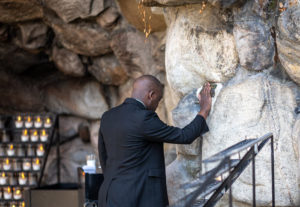
Fr. Arthur Joseph Ssembajja praying in the Grotto
Outside the chapel, while he also adjusts to the capricious northern Indiana climate, Ssembajja struggles like that rest of us in confused disbelief over our world being brought to such a sudden standstill.
“I had never imagined a time when everything seems to stop in the whole world, including public Mass,” he says. “I had never imagined a time when I have to attend all my classes virtually online even when my classroom is a 12-minute ride from my house.
“I am struggling to catch up with the online classes, discussions and meetings. This is a brand new experience for me. I have just added one more story to my story bank for future reference.”
In the end, as he reflects on the experience, he selects the word, “humbling.”
“This is a very deep experience calling us to pay attention to the small things we take for granted: our breath, our families, our friends, our community, our dreams, our blessings and our freedom to move around,” he says. “I think this is a time for us to rediscover our humanity and what really matters to us. In the words of my professor, Viva Bartkus, these are privileged relationships.”

